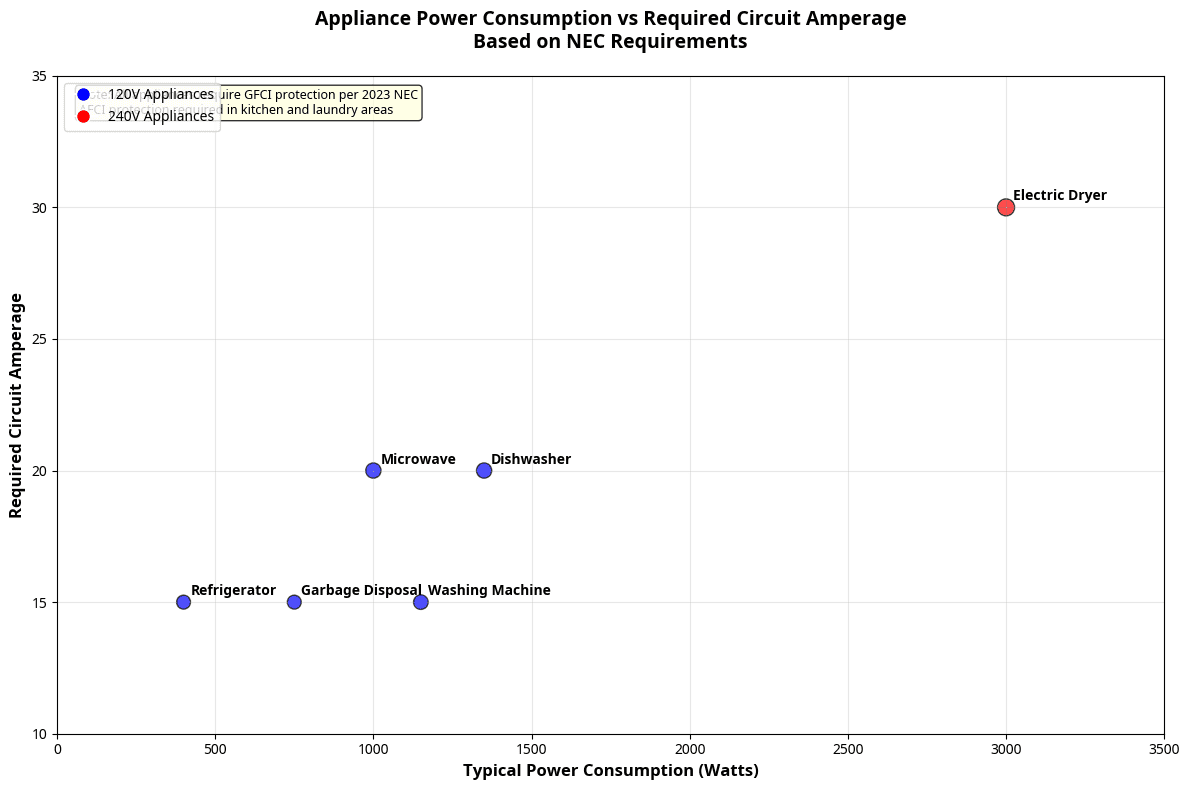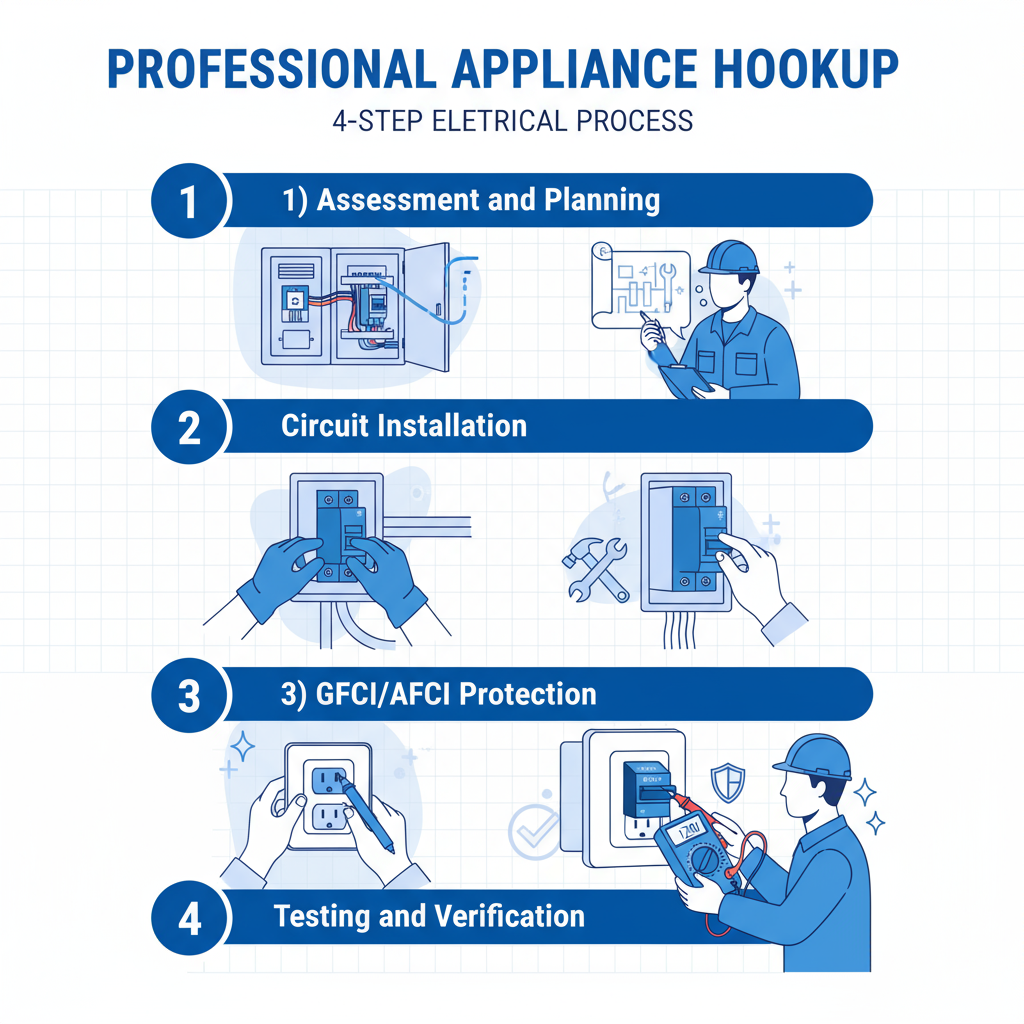Ready to find a career and not just a job? Echelon Services is looking to expand our Team!
Working Hours:
Monday - Friday :
8:00AM to 4:30PM
Saturday & Sunday :
By Appointment Only
Modern homes rely on a suite of powerful appliances, from refrigerators and dishwashers to washers and dryers. However, many homeowners are unaware that these high-draw appliances require dedicated circuits to operate safely and efficiently. According to the National Fire Protection Association (NFPA), electrical failures or malfunctions are the second leading cause of home fires in the U.S.[1]. A dedicated circuit, also known as an individual branch circuit, serves a single appliance, preventing circuit overloads, and reducing the risk of electrical fires. This guide provides an in-depth look at the importance of dedicated circuits for major appliances, outlining the key safety standards, code requirements, and best practices for installation.
Context: Why This Matters in 2025
As homes become increasingly electrified, the demand for safe and reliable power distribution has never been greater. In 2025, the combination of high-efficiency appliances, smart home technology, and the growing adoption of electric vehicles places significant strain on residential electrical systems. The U.S. Department of Energy reports that household appliances account for a significant portion of residential energy consumption[2]. Without proper wiring and circuit protection, the risk of electrical hazards, including arc faults and ground faults, increases substantially. The 2023 National Electrical Code (NEC) has introduced more stringent requirements for Ground-Fault Circuit Interrupter (GFCI) and Arc-Fault Circuit Interrupter (AFCI) protection in homes, particularly in kitchens and laundry areas, to mitigate these risks. For homeowners, understanding these requirements is crucial for ensuring the safety of their families and the longevity of their valuable appliances. Echelon Services is committed to providing expert guidance and code-compliant installations to meet these evolving standards.
Service Coverage & Options
Included Services
- Knob & Tube (K&T) Replacement
- Aluminum Wiring Remediation
- Grounding and Bonding
- 3-Prong/GFCI Conversions
- Panel Corrections and Upgrades
Typical Use Cases
Our services are designed to address a wide range of needs, from new appliance installations to comprehensive electrical system upgrades. We provide dedicated circuit installations for new washers, dryers, refrigerators, and dishwashers, ensuring that each appliance has the power it needs to operate safely. We also specialize in replacing outdated or unsafe wiring, such as knob and tube or aluminum, and correcting grounding and bonding issues to bring your home up to modern safety standards. Whether you’re renovating your kitchen, finishing your basement, or simply upgrading your appliances, our team has the expertise to ensure your electrical system is safe, reliable, and code-compliant.
Appliance Circuit Requirements
| Appliance | Circuit Requirements | Voltage | GFCI Required | AFCI Required |
|---|---|---|---|---|
| Electric Dryer | 30-amp dedicated circuit | 240V | Yes[3] | Yes (laundry areas)[4] |
| Washing Machine | 15-20 amp dedicated circuit | 120V | Yes[3] | Yes (laundry areas)[4] |
| Refrigerator | 15-20 amp dedicated circuit | 120V | Yes (kitchen)[3] | Yes (kitchen)[4] |
| Dishwasher | 15-20 amp dedicated circuit | 120V | Yes[3] | Yes (kitchen)[4] |
| Garbage Disposal | 15-20 amp dedicated circuit | 120V | Yes (kitchen)[3] | Yes (kitchen)[4] |
| Microwave (built-in) | 20 amp dedicated circuit | 120V | Yes (kitchen)[3] | Yes (kitchen)[4] |
Safety, Codes & Sizing Essentials
Properly sizing and installing dedicated circuits is essential for electrical safety. The 2023 NEC mandates both GFCI and AFCI protection for most appliance circuits in kitchens and laundry areas. GFCI devices protect against electrical shock by detecting ground faults, while AFCI devices protect against fire by detecting dangerous arc faults in wiring. ENERGY STAR certified appliances can significantly reduce energy consumption. For example, an ENERGY STAR certified clothes washer uses about 20% less energy and 30% less water than a standard model, saving homeowners an average of $530 over the lifetime of the appliance[5].

Installation Process, Quality & Limitations
A professional installation is critical for ensuring the safety and performance of your dedicated appliance circuits. The process begins with a thorough assessment of your home’s electrical system, including the main service panel, existing wiring, and grounding. Our licensed electricians will then determine the appropriate wire gauge and circuit breaker rating for each appliance based on its power requirements and the NEC. We take great care to minimize disruption to your home, and we pride ourselves on our clean and efficient workmanship. However, it’s important to be aware of potential limitations, such as outdated wiring that may need to be replaced or a service panel that may require an upgrade to accommodate the new circuits. We will always discuss these issues with you upfront and provide a clear and transparent estimate for any additional work that may be required.

Action Plan
If you are planning to install new appliances or are concerned about the safety of your existing electrical system, we recommend the following steps. First, take note of the make and model of your appliances to determine their power requirements. You can usually find this information on the appliance itself or in the owner’s manual. Next, inspect your electrical panel to see if you have any available slots for new circuits. If you are unsure about any of these steps, or if you have any concerns about your home’s wiring, we strongly recommend that you contact a licensed electrician. Echelon Services offers comprehensive electrical safety inspections and can provide you with a detailed assessment of your home’s electrical system. Contact us today to schedule an evaluation.
Future Outlook
The trend towards home electrification is only expected to continue, with smart appliances, electric vehicle charging, and other high-draw devices becoming increasingly common. This will place even greater demands on residential electrical systems, making it more important than ever to ensure that your home is equipped to handle the load. The NEC is also likely to become even more stringent in the future, with new requirements for energy efficiency, safety, and smart grid integration. By investing in a professional installation of dedicated circuits today, you can ensure that your home is prepared for the future of energy.
Key Takeaways
- Major appliances require dedicated circuits to prevent overloads and reduce the risk of fire.
- The 2023 NEC mandates GFCI and AFCI protection for most appliance circuits in kitchens and laundry areas.
- ENERGY STAR certified appliances can save you hundreds of dollars in energy costs over their lifetime.
- A professional installation is essential for ensuring the safety and performance of your dedicated appliance circuits.

